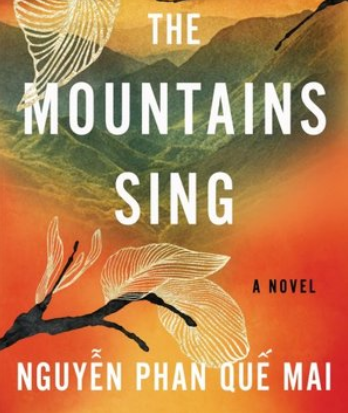
‘The Mountains Sing” A Song Of Many Voices
THÚY ĐINH
The Mountains Sing

In The Mountains Sing, Nguyễn Phan Quế Mai has created a luminous, complex family narrative that spans nearly a century of Vietnamese history, from the French colonial period through the communist Viet Minh’s rise to power, the separation between North and South Vietnam, the Vietnam War, all the way to the present day. Told alternately by Diệu Lan, born in 1920, and her granddaughter Hương, born in 1960, the novel resembles a choral performance with multiple voices.
Diệu Lan is the family matriarch — bereft of father, husband, brother, and eldest son due to war and occupation, she weathers historical changes and economic hardship with self-reliance, intelligence, creativity, and kindness. Born in the same province as revolutionary leader Hồ Chí Minh, Diệu Lan’s actions reflect her own idea of independence. During the era before Vietnam’s economic reforms of the 1980s, she becomes a black marketeer to improve her family and community living conditions. She introduces contraband American literature to her granddaughter, hoping to broaden Hương’s intellectual horizons, and shows unwavering love to a son who fought in the pro-American South Vietnamese Army.
The Mountains in the title represent the Vietnamese people and their land, and Sing standsfor the novel’s celebration of plural perspectives. Mountains Sing is also the literal meaning of sơn ca, the Sino-Vietnamese word for the hand-carved wooden lark that Hương inherits from her long-lost father. As a symbol of immortality in Vietnamese culture, the sơn ca also brings to mind Yeats’s golden nightingale, his avatar in “Sailing to Byzantium” that sings of “what is past, or passing, or to come.”
The past figures prominently in Quế Mai’s novel, for it still affects the present and the future. The author dedicates The Mountains Sing to her grandmother, who perished in the Great Famine of the 1940s when Japan occupied Vietnam, to her grandfather who died because of the harsh land reform policy imposed by the North Vietnamese Communist government in 1955, and to her uncle, “whose youth the Vietnam War consumed,” as well as millions of Vietnamese and non-Vietnamese who lost their lives in the war.Article continues after sponsor messagehttps://5bacdb423a428db7f08f7e251c8d88b2.safeframe.googlesyndication.com/safeframe/1-0-37/html/container.html
‘The Mountains Sing’ affirms the individual’s right to think, read, and act according to a code of intuitive civility, borne out of Vietnam’s fertile and compassionate cultural heritage.
Born in 1973 in North Vietnam, Quế Mai relocated at six with her family to the South, before winning a university scholarship to study in Australia. She later decided to pursue a writing career exploring the long lasting socio-psychological consequences of the Vietnam War. This background gives Quế Mai an astute and graceful ability to sustain contradictory truths about war, displacement, aesthetic representations, and human nature. In The Mountains Sing, Hương is able to see the humanity of her so-called American enemies because she’s read Laura Ingalls Wilder’s depiction of the close-knit pioneer family in Little House in the Big Woods (a book she acquired from her grandmother Diệu Lan’s black market trade). At the same time, beauty does not exempt a culture from its inhumanity; at one point, Diệu Lan observes that an elegant haiku about a frog by the Japanese poet Basho could not save the Vietnamese from the brutality of their Japanese occupiers.
Most importantly, the novel helps all of us see “the enemy” not as abstract or demonic, but corporeal, even familial. An American bomber who falls out of the sky, Icarus-like, is as vulnerable as someone’s brother who fights for the other side. The Vietnam War is not only an international ideological struggle, but also a civil war among kin. A character laments, “But what if one of my comrades had his gun pointed at your forehead? Would I kill my brother in arms to save my brother in blood?”
In depicting the dire consequences of war and Marxist ideology, which forced citizens and family members to become either traitors or patriots, The Mountains Sing affirms the individual’s right to think, read, and act according to a code of intuitive civility, born out of Vietnam’s fertile and compassionate cultural heritage.
And yet, despite the novel’s wondrously balanced approach, true reparation has yet to take place between the Vietnamese state and its people. The “enemies” that Diệu Lan faces when she returns to her home town are not her true enemies, but merely agents of an oppressive Marxist regime that engineered the disastrous land reform.
At the end of the day, the fact that The Mountains Sing is published in English means its content still faces translation and censorship hurdles before reaching readers in Vietnam. Can Nguyễn Phan Quế Mai’s message be heard in her homeland, where the mountains of Vietnam are still a fortress silencing the sounds of birds?
Thúy Đinhis a writer, literary translator, and co-editor of the Vietnamese e-zine Da Màu (Multitude). Her work has appeared in NBCThink, Asymptote, diaCRITICs, Amerasia Journal, Pop Culture Nerd, among others.

